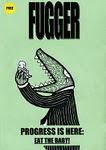In 1920, the American psychologist John
B. Watson of Johns Hopkins University embarked on a disturbing
experiment to develop irrational phobias in human beings. He paid an
impoverished mother one dollar so he could experiment on her infant
son, who he renamed ‘Little Albert.’
Watson exposed Little Albert to rabbits and
puppies. Little Albert happily played with the animals until Watson loudly clanged
metal pots and pans to alarm the baby. A phobia of furry creatures was
successfully installed and Little Albert was sent on his way to live with it
for the rest of his one dollar life.
A delighted Johns Hopkins raised
Watson’s salary by 50% to keep him at the university, but later
fired him for sleeping with one of his students. Watson then went to
work in… can you guess? I’ll give you a moment to guess what
industry Watson went on to work in.
That’s right, advertising!
Watson was
employed by the J. Walter Thompson agency and tasked with scaring
consumers into purchasing certain products. Watson made out, for example,
that not using a particular brand of toilet roll would land your arse on
an operating table.
In his advertising, Watson played upon
what he termed the ‘fear response’, part of what was understood
to be the ‘hypochondriac culture’ of the 20th century. Watson
sought to appeal to readily malleable emotions rather than
recalcitrant, rational intellects.
Watson claimed that he was able to do
what he did because of a ‘lack of individuality in the emerging mass
society’. In 1935 he wrote a book called ‘Influencing the Mind of
Another’ where he boasted that he ‘could make any human being
afraid of any object in the world.’
Watson famously viewed human beings as
programmable machines. He said that we are ‘made’ and not ‘born.’
Maybe he thought this because he was a machine himself, a machine
that could not pity a distressed infant. Maybe he thought we are all
like him. Was he right?
Right or wrong, his approach was
certainly effective. We are part conditioned by his methods and much
of our culture is made in his image. Taking the baton from the holy
men who preceded him, this machine man used fear to control us and he
made us love it.
In his book, ‘Mechanical Man: John B.
Watson and the Beginnings of Behaviourism’, Kerry Buckley wrote
that Watson inspired a ‘progressive dream’ where science is ‘a
new religion’ with ‘a binding faith for its practitioners.’
Get on your knees. We are all Little Alberts
now.








